|
|
|
Sort Order |
|
|
|
Items / Page
|
|
|
|
|
|
|
| Srl | Item |
| 1 |
ID:
086447
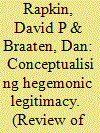

|
|
|
|
|
| Publication |
2009.
|
| Summary/Abstract |
What is international legitimacy and whence does it stem? What entities seek it and why, and who grants or withholds it? How might the different meanings of the concept be reconciled? This article argues that Family Resemblance Concept (FRC) methods are particularly well-suited to explicating the complex meanings associated with this multidimensional concept. We start with a basic level definition based on subjective perceptions and beliefs, the normative quality of oughtness, and the idea of consent. We then expand this definition by developing several secondary-level dimensions: shared values, constitutionalism (consisting of two forms of process legitimacy), and outcome legitimacy. At the indicator level, we examine 14 different survey questions asked in international public opinion polls to provide a tentative empirical glimpse of how our FRC version of legitimacy could be operationalised and tested. The paper concludes with a discussion of the usefulness of the FRC scheme in imposing some order on the legitimacy concept and in illuminating the recent legitimacy problems afflicting the United States.
|
|
|
|
|
|
|
|
|
|
|
|
|
|
|
|
| 2 |
ID:
084058
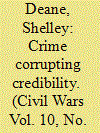

|
|
|
|
|
| Publication |
2008.
|
| Summary/Abstract |
If crime corrupts the credibility of paramilitary to political organizations, at what stage in the process of transition from paramilitary to parliamentary organization do violence and corruption become increasingly objectionable? What mechanisms institute credible organizational change?
Moreover, what mechanisms are most likely to impede organizational transformation and determine the degree to which criminal-military elements are successfully pacified by the political process? This paper addresses the protagonists' problem of curtailing criminality, clientelism, corruption and long standing predation in protracted peace processes. The findings suggest that the nature of corruption can determine the duration of the transition.
The prevalence of criminality clientelism, patronage, or predation is determined by the organizational structure of the group. The more 'monolithic', cohesive and integrated the rebel-to-political group, the more seamless the evolution from paramilitary-to-parliamentary.
|
|
|
|
|
|
|
|
|
|
|
|
|
|
|
|
| 3 |
ID:
099038
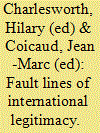

|
|
|
|
|
| Publication |
Cambridge, Cambridge University Press, 2010.
|
| Description |
x, 406p.
|
| Standard Number |
9780521764469, hbk
|
|
|
|
|
|
|
|
|
|
|
|
Copies: C:1/I:0,R:0,Q:0
Circulation
| Accession# | Call# | Current Location | Status | Policy | Location |
| 055286 | 341/CHA 055286 | Main | On Shelf | General | |
|
|
|
|
| 4 |
ID:
191928
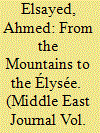

|
|
|
|
|
| Summary/Abstract |
This article examines the international legitimacy of the main Kurdish militia in northern Syria, the People's Defense Units (YPG), and its affiliated political party, the Democratic Union Party (PYD). Despite their origins in the Kurdistan Workers Party (PKK), listed as a terrorist organization in many countries, the YPG and PYD were anointed as partners of the Global Coalition against Daesh/ISIS and have been celebrated in Western capitals and press ever since. To understand this unusual trajectory, this article argues that, although defeating ISIS opened a "possibility space" for this alliance to emerge, the YPG and PYD's discursive and practical legitimation strategies have contributed to their remarkable international diplomatic standing. This position nevertheless remains perilous, largely due to an insurmountable barrier: Turkey.
|
|
|
|
|
|
|
|
|
|
|
|
|
|
|
|
| 5 |
ID:
074524
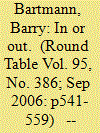

|
|
|
| 6 |
ID:
171708


|
|
|
|
|
| Summary/Abstract |
Scholars argue that the 1991 Gulf War, when the United States worked hard to secure approval from the United Nations (UN), set a precedent for legitimate military intervention that other states, especially other liberal democracies, subsequently felt compelled to follow. France, however, continued to intervene unilaterally in its traditional African sphere of influence for several years, without seeking approval from the UN or regional bodies. Even after France drew widespread opprobrium for its support of a murderous regime in Rwanda, French leaders deployed thousands of combat troops unilaterally on various missions. This article relies on original interviews with French policymakers as well as on primary documents to make the case that the 2002–04 Côte d’Ivoire intervention finally steered French Africa policy towards greater multilateralism. It drove home the danger that unilateral interventions could fuel anti-French sentiment among African audiences, undermining France’s regional influence. Ultimately, therefore, concerns about African acceptance more than broader international pressure led France to fully embrace new norms of legitimate intervention.
|
|
|
|
|
|
|
|
|
|
|
|
|
|
|
|
| 7 |
ID:
145079
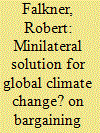

|
|
|
|
|
| Summary/Abstract |
Gridlock in the multilateral climate negotiations has created growing scholarly and practical interest in the use of minilateral forums. A large variety of climate club proposals have been developed in recent years, which promise more effective bargaining among the main climate powers, better incentives to encourage mitigation efforts and discourage free-riding, and new ways to align international power asymmetries with the interests of the global climate regime. I investigate the three dominant rationales that underpin minilateralist proposals. I offer a critical review of their potential as well as their limitations in promoting global climate action. I argue that minilateralism is unlikely to overcome the structural barriers to a comprehensive and ambitious international climate agreement. However, climate clubs can enhance political dialogue in the context of multilateral negotiations and can provide a more conducive environment for great power bargaining. They can create club benefits that strengthen mitigation strategies and help reduce the dangers of free-riding for so-called coalitions of the willing. And they can help re-legitimate the global climate regime against the background of profound power shifts that have slowed down progress in the multilateral negotiations.
|
|
|
|
|
|
|
|
|
|
|
|
|
|
|
|
| 8 |
ID:
157000


|
|
|
|
|
| Summary/Abstract |
At the last moment when this issue was ready to go to the printer, U.S. President Donald Trump came out with his statement officially recognizing Jerusalem as the capital of the State of Israel and instructing the U.S. State Department to move the embassy from Tel Aviv to Jerusalem. The statement will have a far-reaching impact on efforts to achieve a political settlement between the Israelis and the Palestinians, and therefore requires a clear, immediate response before it’s too late. President Trump’s decision lacks any international legitimacy or legal justification.
|
|
|
|
|
|
|
|
|
|
|
|
|
|
|
|
| 9 |
ID:
084999
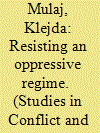

|
|
|
|
|
| Publication |
2008.
|
| Summary/Abstract |
Although no war faction escapes controversy, it is often said that the Kosovo Liberation Army (KLA) is one of the most successful guerrilla movements in recent history. This article suggests that KLA's success can be attributed to the symbiosis between national and international legitimacy. The guerrilla's mission should be understood in the context of persistent oppression of the Kosovo Albanians by Serbian governments. Whilst failure of peaceful resistance enabled KLA's national legitimation, its tactics and strategy acted as a force multiplier for its recognition and success. KLA's resilience in the face of vicious Serbian suppression of Kosovo Albanians raised international awareness and prompted NATO's support, an act that contributed to guerrillas' endorsement at the international level.
|
|
|
|
|
|
|
|
|
|
|
|
|
|
|
|
| 10 |
ID:
159678
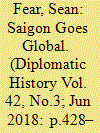

|
|
|
|
|
| Summary/Abstract |
This article examines South Vietnam’s global diplomacy after constitutional government was restored in 1967. Far from an American puppet, the Saigon government showed considerable initiative spanning the globe for prospective allies. But its bid for international legitimacy ended in failure, with increased global exposure only underscoring its collapsing domestic support.
|
|
|
|
|
|
|
|
|
|
|
|
|
|
|
|
| 11 |
ID:
138319
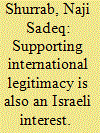

|
|
|
| 12 |
ID:
127657
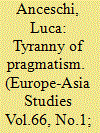

|
|
|
|
|
| Publication |
2014.
|
| Summary/Abstract |
The pragmatic interests of Kazakhstan and the European Union have profoundly influenced the relationship between them, preventing the establishment of successful cooperation in the human dimension. This article investigates these dynamics in detail, placing its spotlight on the role assigned to the relationship with the European Union in the most recent technologies of power devised by the Kazakhstani regime. Particular attention here will be devoted to the tension between the regime's search for international legitimacy and its efforts to insulate itself from EU pressures for political liberalisation.
|
|
|
|
|
|
|
|
|
|
|
|
|
|
|
|
| 13 |
ID:
139004
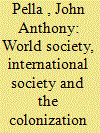

|
|
|
|
|
| Summary/Abstract |
This article utilizes an English School approach to examine the European colonization of Africa between 1871 and 1908. Drawing upon Clark's framework for understanding the relationship between world society, international society and international institutions, it argues that the colonization of Africa was very much dependent upon the activity of non-state actors who essentially pushed European states into the formal colonization of the African interior. Such a case sheds important light on the destructive role world society has played in international politics, a topic which has received no attention in the English School literature. Moreover the study provides additional empirical insights into the relationship between world society, international society and international institutions, while also bringing much needed empirical discussion of colonization into the English School catalogue.
|
|
|
|
|
|
|
|
|
|
|
|
|
|
|
|
|
|
|
|
|